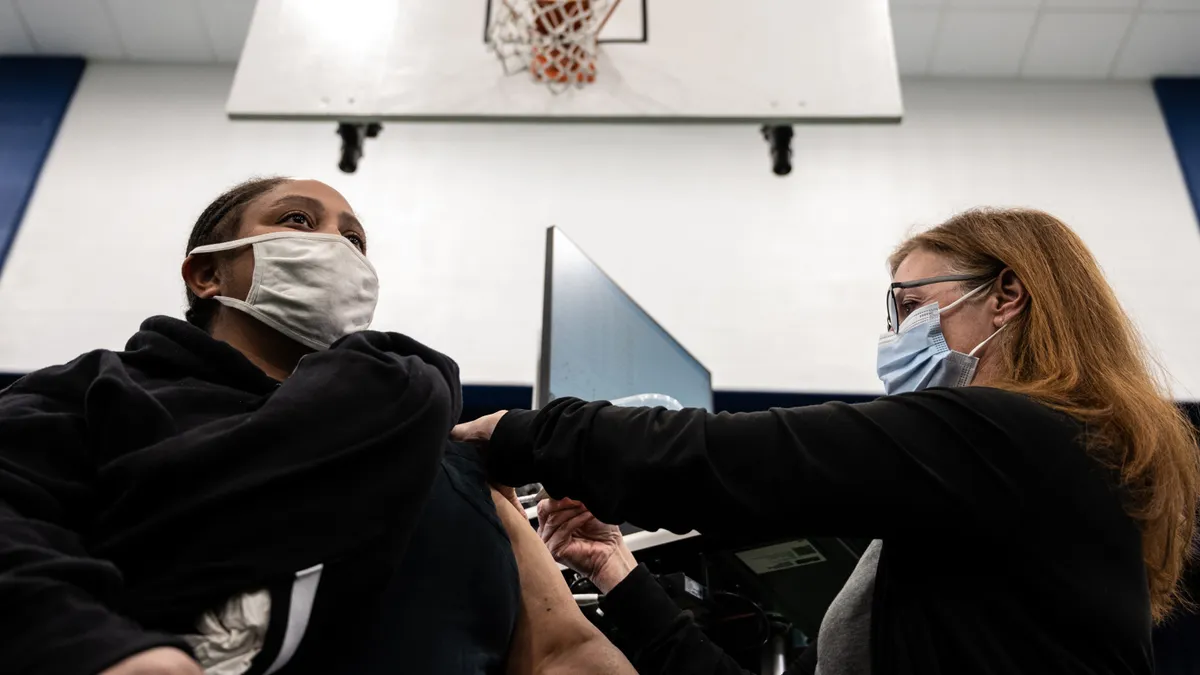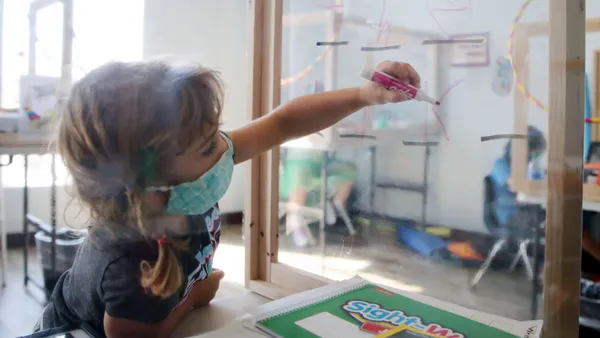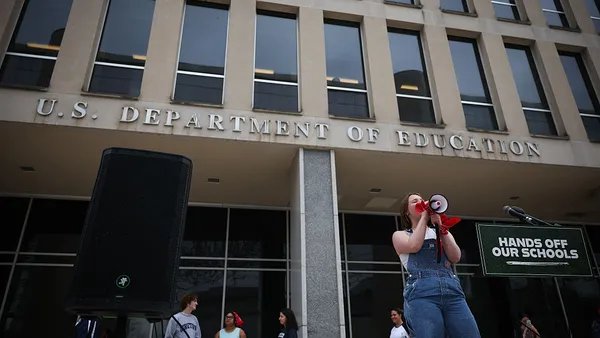UPDATE: May 10, 2020: The U.S. Food and Drug Administration on Monday authorized the use of Pfizer's COVID-19 vaccine for 12- to 15-year-olds. A Centers for Disease Control and Prevention advisory committee is now expected to review data and make recommendations for its use among that age group, The New York Times reports.
Dive Brief:
-
Although there are not yet emergency use approvals for COVID-19 vaccines for students younger than 16, school systems should begin to have conversations about if or how they will set protocols around vaccine requirements, advised Alana Genderson, a senior associate at Morgan Lewis law firm.
-
Genderson said school administrators should first become familiar with state and local policies on vaccination requirements and the rules around exemptions, as well as how they will address violations, such as prohibiting in-person learning for those who don’t comply.
-
Much of the focus at the K-12 level so far has not been on requiring a COVID-19 vaccination for student attendance and enrollment, but on encouraging teachers, school staff and students 16 years and older to get vaccinated. High rates of inoculated teachers and school staff have helped the expansion of in-person learning this spring, educators said.
Dive Insight:
Laurie Combe, president of the National Association of School Nurses, said much of school nurses’ work currently is focused on vaccine education and even running or developing school-based vaccination clinics for the equitable distribution of opt-in student vaccines, provided with parental permissions, as well as vaccines for staff.
There is some vaccine hesitancy among school staff so nurses and school administrators are working with local health departments to share information about vaccine protections and other information, Combe said.
“[Schools] should not be shy about sharing educational material about COVID vaccines, and where there's a school nurse, those are usually trusted health care providers that families are familiar with,” Combe said. (May 12 is National School Nurse Day.)
She said she has not heard of any K-12 school systems considering COVID-19 vaccine requirements for students, particularly since the vaccines are under emergency use authorization and do not yet have full U.S. Food and Drug Administration approval.
The FDA is expected to give emergency use authorization for the Pfizer COVID-19 vaccine for children ages 12-15 soon, and the Biden administration has directed states to make adolescents eligible for vaccination immediately once that authorization is given.
White House Press Secretary Jen Psaki said during a May 4 press conference that the federal government would not require that students be vaccinated for COVID-19.
A poll conducted by the National Parents Union found 62% of public K-12 parents surveyed said they plan to have their children vaccinated when COVID-19 vaccines become available for their child. The survey also found 51% of parents said COVID-19 vaccinations should be required for teachers and staff; 38% said they should be required for students.
Another recent survey by the Kaiser Family Foundation COVID-19 Vaccine Monitor shows that three in 10 parents of children ages 12-15 say they will get their child vaccinated as soon as a vaccine is available and 18% plan to get their child vaccinated if their school requires it. Nearly a quarter say they will definitely not get their child vaccinated.
One of the main responsibilities of a school nurse is to make sure students' required vaccinations for school attendance are up-to-date, Combe said.
According to the Centers for Disease Control and Prevention, state laws establish vaccination requirements and exemptions for school children. Those laws can apply to private and public schools, as well as daycare programs. The CDC says all states provide exemptions for vaccinations for medical reasons, and some states also offer exemptions for religious or philosophical reasons. Enforcement of school vaccination requirements can also be set by state policies.
For example, the District of Columbia has a No Shots, No School policy that prevents students from in-person learning if they are noncompliant with required immunizations, and most Massachusetts students are required to have influenza immunizations.
In Texas, state policy allows localities to add more required vaccinations for school attendance but not less than what is mandated by the state, said Combe. It's rare, however, for localities to do this in Texas, she added.
No. Individual school districts should not be determining which vaccines are mandatory. We don’t decide—and shouldn’t—when it comes to measles, hepatitis, etc. Same should hold for Covid. This is a state level decision. Or am I missing something? @WADeptHealth @waOSPI https://t.co/g2gKpCDXqC
— Susan Enfield (@SuptEnfield) May 8, 2021
The CDC does recommend — but not require — vaccines that protect against five different diseases, including measles, mumps and rubella, for children ages 4-6.
Genderson said knowing state and local vaccine policies is a good starting point for school leaders as they consider their approaches to COVID-19 vaccine requirements. She also recommends school leaders discuss potential policies with local health experts, as well as with school attorneys.
Although the list of required vaccines for students typically doesn’t change year-to-year, the availability of COVID-19 vaccinations may cause cities and school systems to review their approaches, Genderson said. For example, Florida Gov. Ron DeSantis recently signed legislation that prohibits businesses or governments from requiring people to show proof they received a COVID-19 vaccination.
“This legislation ensures that legal safeguards are in place so that local governments cannot arbitrarily close our schools or businesses,” DeSantis said in a statement.
Setting vaccination policies at the K-12 level is not without controversy and can be a trigger for litigation against school systems, according to a 2017 article published in the Journal of Law, Medicine and Ethics.








 Dive Awards
Dive Awards






